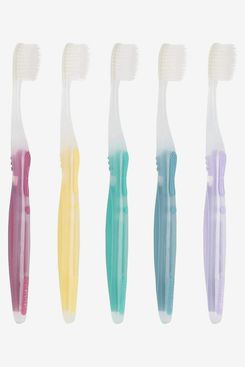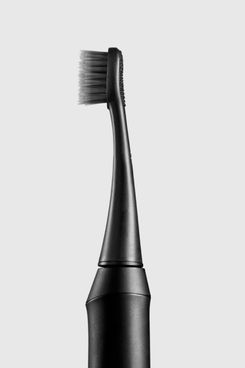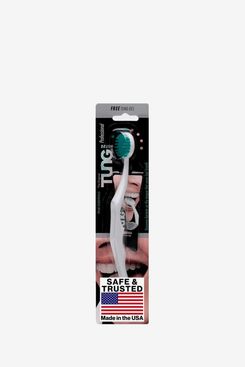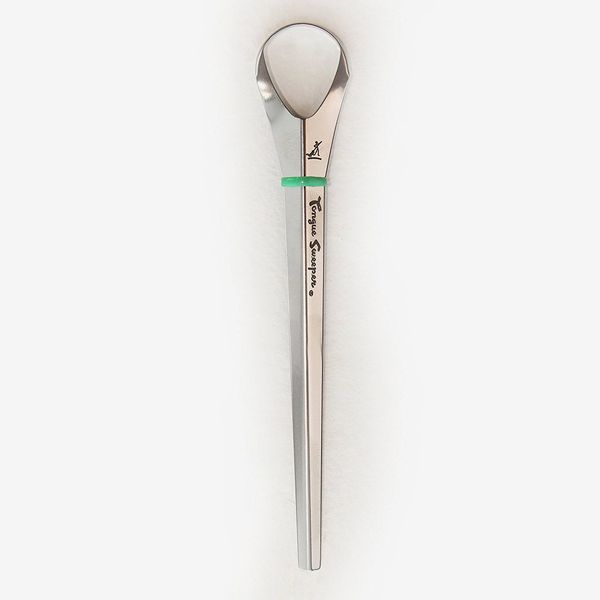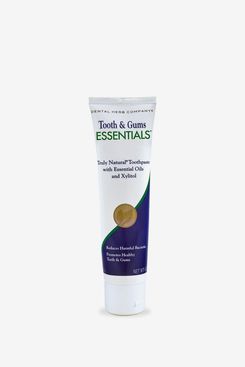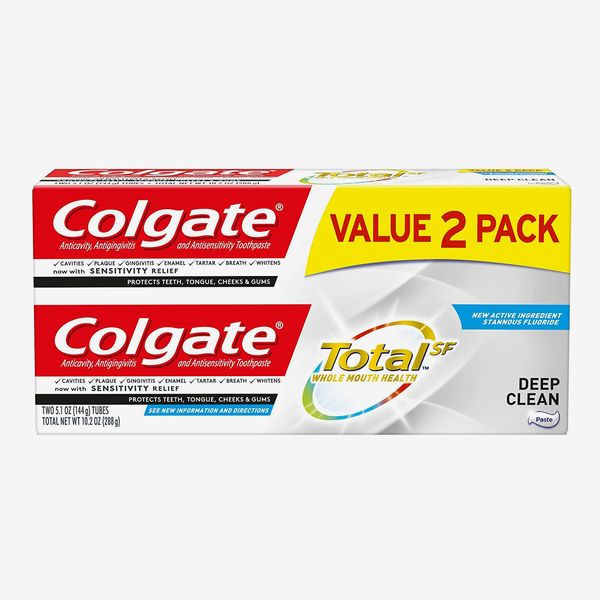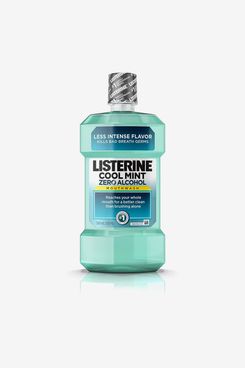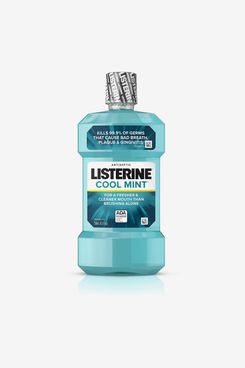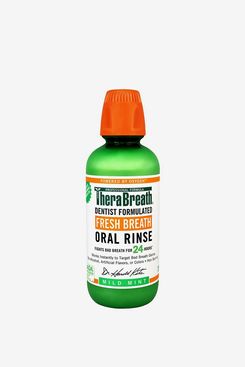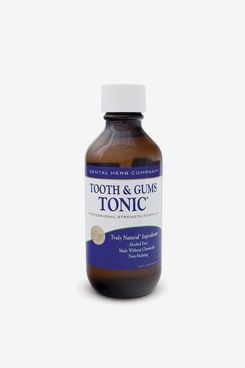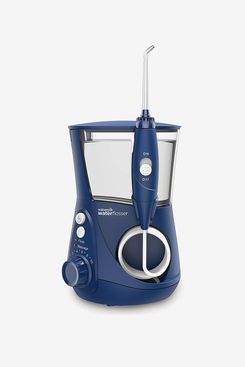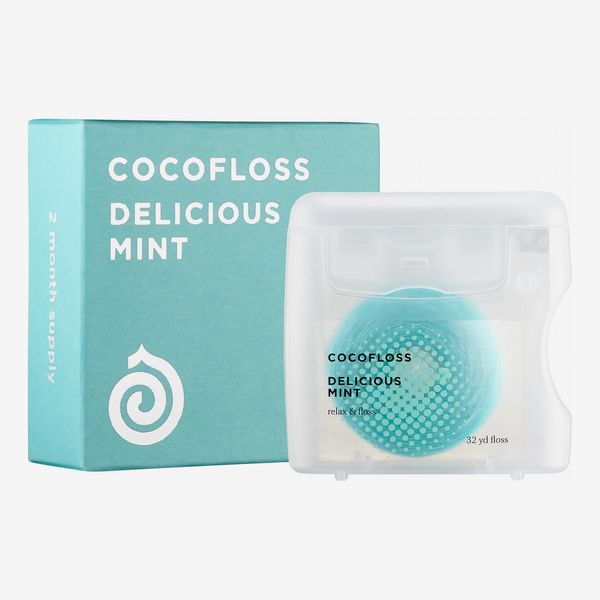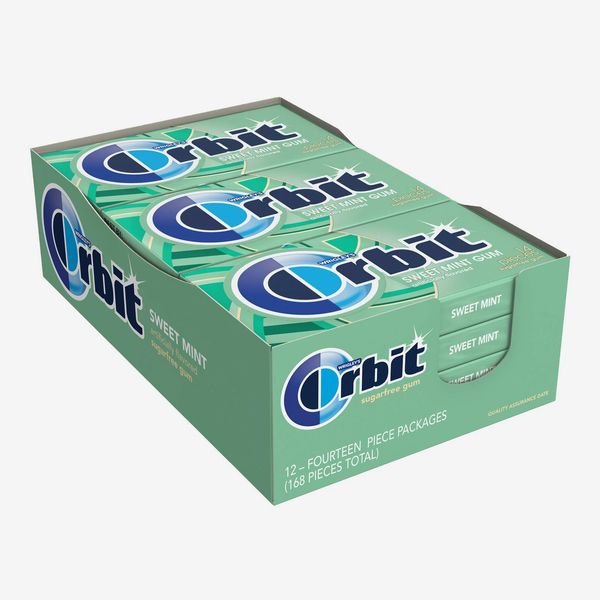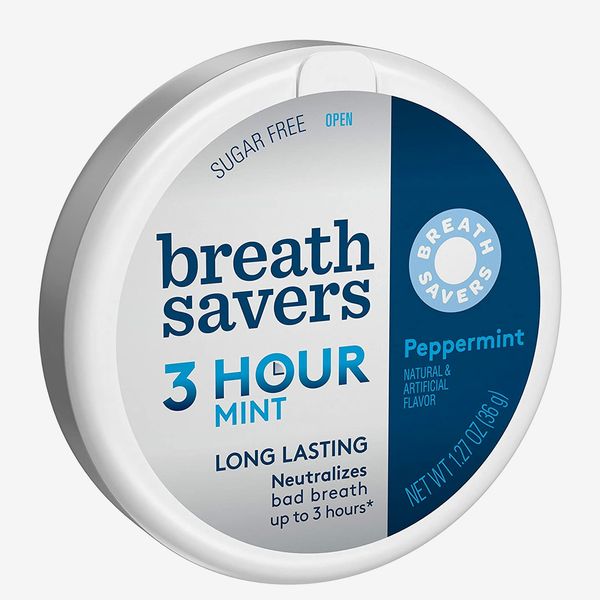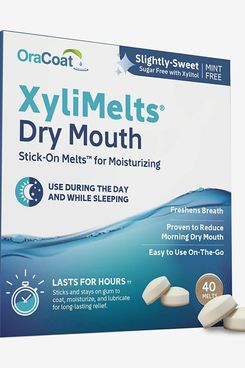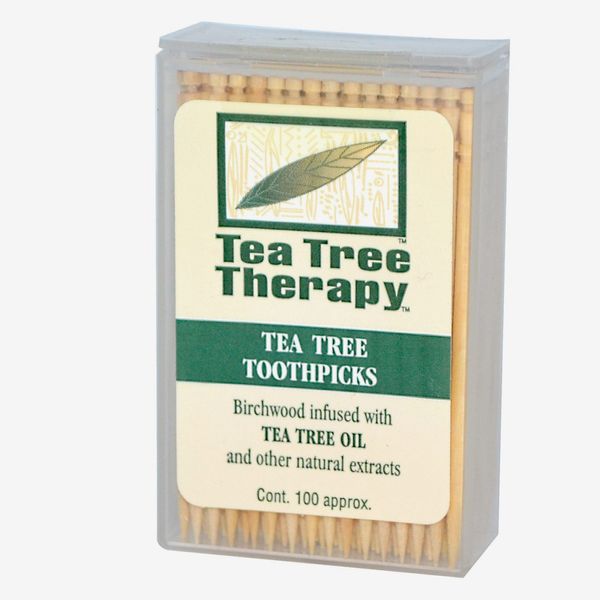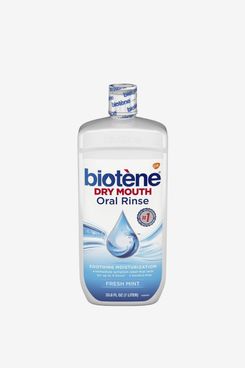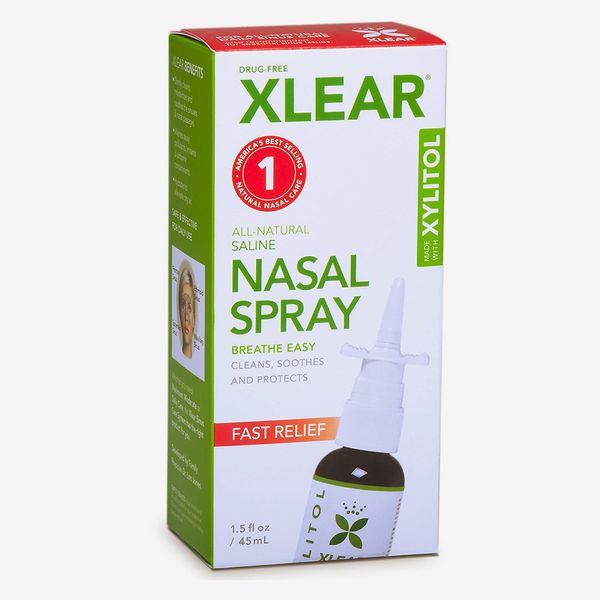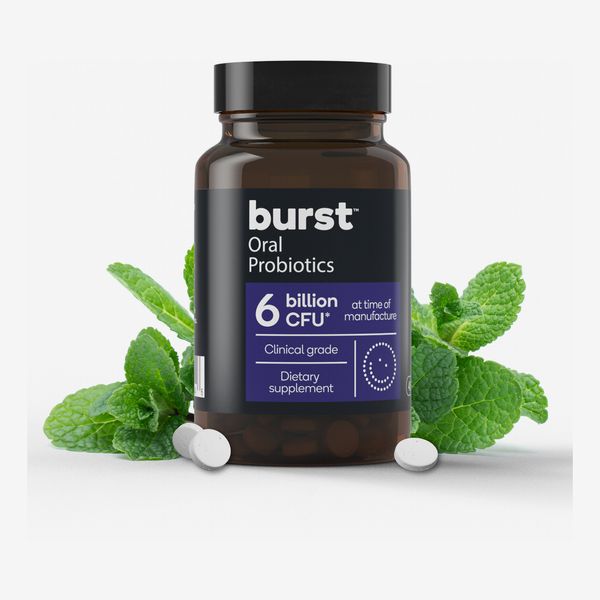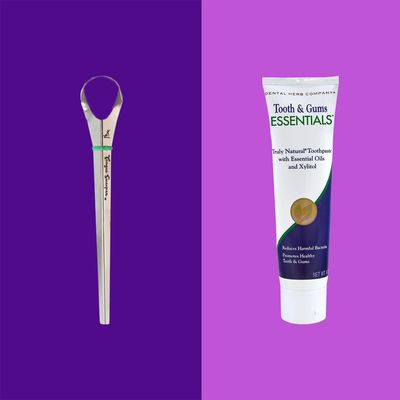
While we may all be curious about the best plunger or probiotic tampon or cold-sore remedy, it can be difficult to discuss these more personal items. That’s why we’re tackling Things We Don’t Talk About, a series in which we track down the best hygiene-, sex-, and bodily function–related things we all need but might be too embarrassed to ask about. In this installment, we consult experts on the best treatments for bad breath.
There is morning breath and then there’s bad breath — that persistent, noxious smell even mouthwash can’t kill. Most of us want to avoid both. “Socially and in the workplace, bad breath is a really bad thing, like body odor,” says halitosis expert Steven Fox, D.D.S., of Fox Fresh Breath Dental. And while eating garlic or anchovies would be an obvious culprit, “80 percent of bad breath usually comes from the dental environment (like gingivitis or bad dental hygiene), and 20 percent from things like indigestion, tonsils, or sinuses,” says Scott Froum, a periodontist who often treats cases of bad breath. At the root of bad breath is the build up of bad bacteria, which “naturally live in your mouth,” according to Dr. Ben El Chami, the co-founder and chief dental officer at dntl bar. “The bacteria feed on the leftover food material in your mouth and cause a foul smell as a byproduct.”
Extreme cases of halitosis, the medical term for chronic bad breath, afflict about a quarter of the population. If no amount of mints, mouthwash, or toothpaste have helped you so far, something is likely causing the bacteria to produce the scent — and that kind of bad breath needs to be investigated by the dentist. For run-of-the-mill bad breath that plagues most people, though, periodontist Mike Breault says that good oral hygiene — brushing and flossing, plus regular cleanings with your dentist — is most important. To find more immediate, specific treatments, we asked the experts for their best over-the-counter recommendations.
Tooth and tongue brushes
All the experts we spoke to recommend regular trips to the dentist and properly cleaning your teeth at home as the best way to beat bad breath. According to Dr. Sharon Huang, the founder of Les Belles NYC, a holistic dentistry practice in Manhattan, “mechanical removal is the most effective route of removing bacteria. [That means] flossing daily and brushing twice a day, not just the teeth but also the gum area and the tongue.” Her favorite manual toothbrush is this supersoft one from Nimbus. “It’s actually the most gentle toothbrush I’ve ever used,” Dr. Huang says. “ A common misconception is that you want to brush your teeth really hard to remove the debris, but that is actually not the case. You want to use a really soft bristle to gently remove the bacteria without stripping the enamel.”
If you think you can still brush gently with an electric toothbrush, Dr. Huang uses Burst’s sonic toothbrush. “I’ve tried many electric brushes on the market, and most of them, I feel, are a little too aggressive,” she says. This one, however, is a “gentle ultrasonic toothbrush.” It has soft, charcoal-infused bristles and a sensitive mode, if you think you might be brushing too hard.
Dr. Huang says you can clean your tongue with your normal toothbrush, but there are also special tools designed for it. This is one of Dr. Marie Jackson of Stellar Smile Center’s favorites. “It’s nice because it’s got these soft but firm nylon brushes, they’re a little bit different than toothbrush versions, their shape is a little more broad so It allows you to kind of clean your tongue without being too aggressive.” Both Dr. Jackson and Dr. Elisa Mello of NYC Smile Design prefer a plastic tongue cleaner like this to something metal, as those can be more aggressive and even hurt or cause cuts. No matter what tool you use, you should use it gently, but don’t be afraid to get a really good clean. “The tongue is not smooth, it’s actually like a shaggy carpet, and at the bottom of the little shaggy pieces is where bacteria hang out, and if you have a coating on your tongue, it could actually take anywhere from two to three weeks to actually remove it,” says Dr. Mello. “I personally tell my patients to brush first, because all the liquid and the toothpaste will sort of loosen up that stuff that’s on your tongue, and then very gently scrape down and scrape it off.” She adds that most patients don’t go far back enough, which can be uncomfortable, so once you get used to it, you can try and go back a little further each time. Dr. Mello says, “You’ll find over time the good bacteria will start to outnumber the bad bacteria that were on your tongue.”
Metal tongue scrapers do have one advantage over the plastic ones: They don’t harbor bacteria. If you think you can use it gently, this medical-grade tongue scraper comes highly recommended by writer Or Gotham as a solution for morning breath. After using this he says, “You’ll realize, as I did, that the amount of gunk not removed by simple brushing is … alarming.”
Toothpastes
You should also be paying attention to toothpastes. Dr. Mello uses this all-natural toothpaste in her office. “It really maintains a nice balance because it’s natural,” she says. “ It doesn’t upset the bacteria count, and it really helps to keep everything pH balanced. When the pH is balanced, good bacteria can proliferate, as opposed to the bad bacteria.”
Dr. El Chami likes the Colgate Total line of products as he says they have “the right ingredients to improve the health of the gums and teeth.” One of those ingredients is fluoride, which can help remineralize the teeth and protect you from cavities. If you keep your teeth and gums healthy you can avoid things like gum disease, which can contribute to that bad bacteria build up.
Mouthwash
Foul breath often goes hand in hand with a dry mouth, since saliva does the work of washing away dead cells and bacteria in your mouth. And whether your dry mouth means you’re a coffee fiend or have something chronic like an autoimmune disease, the first thing that Breault and Froum suggest as a solution is nonalcoholic mouthwash that kills bacteria without drying out your mouth. “In terms of mouth rinses, anything nonalcoholic is good because the alcohol will dry up oral mucosa (or, the mucous membrane lining the inside of the mouth) and actually contribute to bad breath,” says Froum. This alcohol-free Listerine is one of Dr. El Chami’s favorites. He says, “It is good for temporary relief of bad breath but mouthwash alone will not get rid of it for more than a temporary basis.”
Dr. Jackson is partial to Listerine’s antiseptic line. It does contain alcohol as an inactive ingredient, but she says this antiseptic mouthwash does the job by killing all the germs that would cause bad breath.
Dr. Jackson likes TheraBreath, too. It’s 100 percent vegan, doesn’t contain alcohol, and won’t give you that burning sensation in your mouth. It also claims to neutralize the sulfur-producing bacteria that Dr. Mello says are the root cause of bad breath. Plus, it’s pH balanced so it won’t throw anything off.
Both Dr. Mello and Dr. Huang like this rinse from Tooth and Gums. It’s all natural and alcohol free. Dr. Huang says it will reduce bleeding and inflamed gums on top of getting rid of dry mouth and bad breath. Dr. Mello recommends it to her patients as well, who now swear by it.
Floss
Regular flossing is another part of daily oral care that can keep bad breath at bay. For specific types of floss, Froum says he usually gravitates toward water picks for patients that want to streamline their dental routine. “That usually helps because they find it easier to do interproximal dental care with a water pick versus floss,” he says. Over the years, more than 20 dentists have recommended the Waterpik brand to us, with this Aquarius model topping the list. Dr. Irina Sinensky of Dental House told us, “It offers water control buttons on the handle, 90-second run time, ten pressure settings, seven different tips, 360-degree rotation of the tip, and a significantly large water tank.” It also has a strong engine, which is important for getting the most food and debris out from in between the teeth.
If you’re on a budget or prefer traditional floss, that’s still a solid option. This tops our list of dentist-recommended flosses and is also a favorite of Dr. Huang. In addition to coming in fun flavors and cute packaging, it’s really effective, she says. “When you use cocofloss, I feel like your teeth are much cleaner because it adheres to the teeth really well.” The floss is also coated with coconut oil, which, according to Dr. Huang, has “natural antibacterial and antifungal properties” that will help fight plaque and gingivitis.
Mints and gum
Another way to combat bad-breath-causing dry mouth is by chewing gum. “Sugar-free gum stimulates saliva, which acts as a self-cleanser for the teeth, reduces the acid created by bacteria that causes cavities, and has calcium and phosphate in it to help strengthen tooth enamel,” says Dr. El Chami. It’s important that the gum be sugar-free, though, because sugar feeds that acid, creating bacteria that causes cavities. Personally he’s a fan of Eclipse, Trident, and Orbit.
If you don’t like gum, Dr. Jackson prefers mints to freshen your breath on the go. Again, these should be sugar-free.
Should you prefer a lozenge, Breault also suggests Xylimelts, which are “little discs, kind of like cough drops, that melt in your mouth to moisturize and lubricate things.”
A little less discrete are these minty tea-tree toothpicks that writer Chris Black recommends and claims are far superior to gum. “There is no sugar or unpronounceable chemicals added, they don’t produce that obnoxious chewing sound, and the tea-tree oil’s natural antiseptic qualities provide fresh breath while killing bacteria,” he says.
Supplements
By now you know the important role saliva plays in keeping your breath fresh, but if you can’t produce enough of your own, you can always buy some. “Artificial saliva is a saliva substitute that can be taken to help lubricate the oral cavity and temporarily alleviate dry mouth which is called xerostomia,” says Dr. El Chami. “There are products made by Biotene that act as a saliva substitute that can be taken orally to help lubricate the oral cavity temporarily.” As Breault explains, it’s a “rinse that coats your mouth and creates a moist environment.”
If sinus problems are causing your dry mouth, Xylitol spray can help. Froum suggests using one to moisturize your nasal passage, while clearing away postnasal drip that may be increasing the amount of bacteria in your mouth.
If you’ve been hearing buzz about dental probiotics, which claim to help promote healthy gums, prevent cavities, and get rid of bad breath, we asked our experts about those too. “There are not a lot of clinical studies on the effectiveness of probiotics,” says Dr. Huang. She explains that gum disease and cavities are caused by bacteria and “what’s most effective against them is active ingredients that will reduce the amount of bacteria that causes gum disease and tooth decay,” but probiotics aren’t an active ingredient and will just increase the level of good bacteria. So they won’t hurt you but they won’t get rid of bad breath causing bacteria either. As Dr. Mello reiterates, “The bad bacteria can really hide and do their damage so you physically have to remove them.” Once you’ve gotten your bad breath under control though and have healthy oral hygiene, probiotics can act as a bonus. Our senior editor Crystal Martin, who’s been brushing, flossing, and using a tongue scraper religiously for years, recently started using these Burst probiotics and says they “really make a difference.” “Say I brush my teeth at night, pop one of these, and go to sleep— the next morning, no morning breath at all,” she says. “I’m like a fairy, I’m a cartoon princess.” Martin explains it won’t give you a minty taste that covers up bad breath, but rather a natural freshness.
The Strategist is designed to surface the most useful, expert recommendations for things to buy across the vast e-commerce landscape. Some of our latest conquests include the best women’s jeans, rolling luggage, pillows for side sleepers, ultra-flattering pants, and bath towels. We update links when possible, but note that deals can expire and all prices are subject to change.
Every editorial product is independently selected. If you buy something through our links, New York may earn an affiliate commission.
